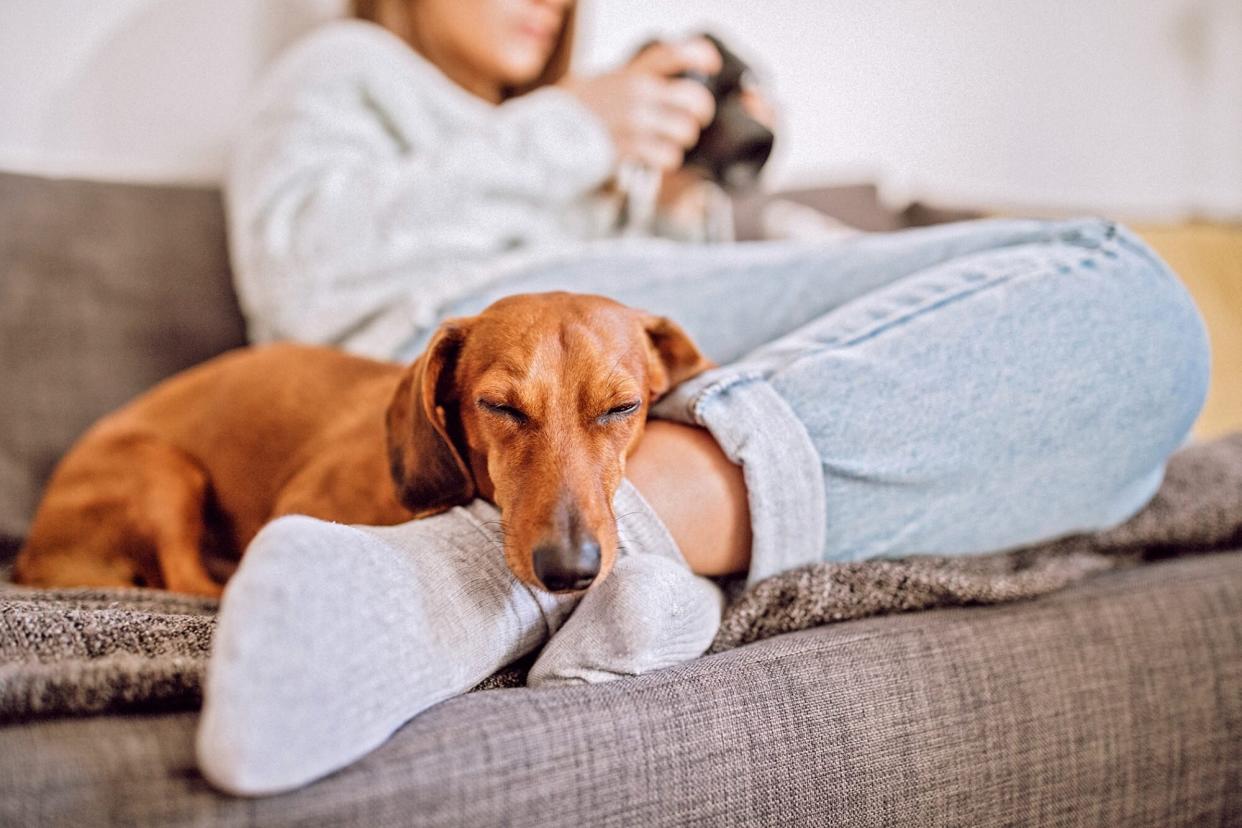Does My Dog Sleep Too Much? Here's What a Vet Says

Pekic / Getty
TABLE OF CONTENTS
On This Page
How Dogs Sleep
Do All Dogs Sleep the Same?
Is My Dog Sleeping Too Much?
Helping Your Dog Sleep Better
It's easy to envy our dogs—especially when they spend their days curled up on the couch while we're navigating Zoom meetings, running errands, and cooking dinner. On average, adult dogs spend 12–14 hours sleeping each day. So if you've ever noticed your pooch snoozing in the afternoon and wondered, "does my dog sleep too much?" there's probably no need to fret. Here's what you should know.
How Dogs Sleep
Research indicates dogs are diurnal: Influenced by daily routines in their household, they sleep mostly at night but also rest frequently throughout the day. By comparison, domestic cats are crepuscular: They have high periods of activity near dawn and dusk. (Though cats sleep a lot, too—up to 15 hours daily.)
RELATED: Do Dogs and Cats Sleep More in the Winter?
Dogs usually doze in 45-minute increments. However, when you spot them curled up with their eyes closed, they might not always be fully asleep—they could simply be resting, ready to spring into action at the first indication of walkies or treats.
George Melillo, DVM, is co-founder and chief veterinary officer of Heart + Paw veterinary clinics. He says dogs spend less time in rapid-eye movement (REM) sleep than people. Dogs enter the REM cycle after about 20 minutes of sleep, and the stage lasts for maybe 5 minutes or so. (Humans can be in REM for up to an hour.) REM is when you might notice them vocalizing and twitching a bit. Dogs dream, too, usually for about 1–5 minutes.
Do All Dogs Sleep the Same?
Not exactly. Melillo says your four-legged friend's snoozing schedule varies depending on aspects such as age, activity level, size, and health.
He also explains that puppies need more sleep than adult dogs—about 18 hours total. It's totally natural for lil' ones to have up to 20 naps a day! As long as they're spritely and eager to eat and play between all that dozing, they're doing just fine. Senior dogs also ebb toward more lengthy rest, especially near the end of their lives.
RELATED: Why Do Dogs Sleep on Their Backs?
Does My Dog Sleep Too Much? Should I Be Concerned?
So, can dogs sleep too much? Sometimes.
"Dogs typically sleep too much out of boredom or due to their lifestyle," Melillo says. So it's important for your furry pal to have the proper amount of both physical exercise and stimulating playtime every day. Consider fun indoor games and outside activities to get all paws moving, boost her spirits, and keep her mentally engaged.
But there could be hidden health concerns making her sleep more, too. "If a dog is sleeping longer than normal, that could be a sign of weakness or underlying disease and should be discussed with the veterinarian," Melillo adds.
Some common reasons why your dog is sleeping too much include:
You might also notice your dog sleeping too much and not eating. These symptoms could be an indication of more serious issues, so arrange for a vet exam right away.
Helping Your Dog Sleep Better
Here's a twist: For some dogs, the problem is not getting enough sleep. "Some dogs have anxiety issues that prevent sleep," Melillo says. "Others may have a disruption in their environment or routine. In some cases, a pet may have pain that affects their ability to get comfortable."
Some studies also indicate that many dogs in shelters or who have lengthy stays in kennels often have trouble sleeping at night. They're more anxious or fearful, and feel secure resting when people are around during the day. This might be behavior you notice in a recently rescued dog.
If your pet receives a clean bill of health but you're still concerned about their sleep habits, establish a more structured routine. Work with your vet or a certified behavior expert to identify areas of concern and develop training methods that incorporate meals, activities, crate training, and cues for bedtime. These experts might also recommend supplements such as melatonin to help the process go more smoothly.

